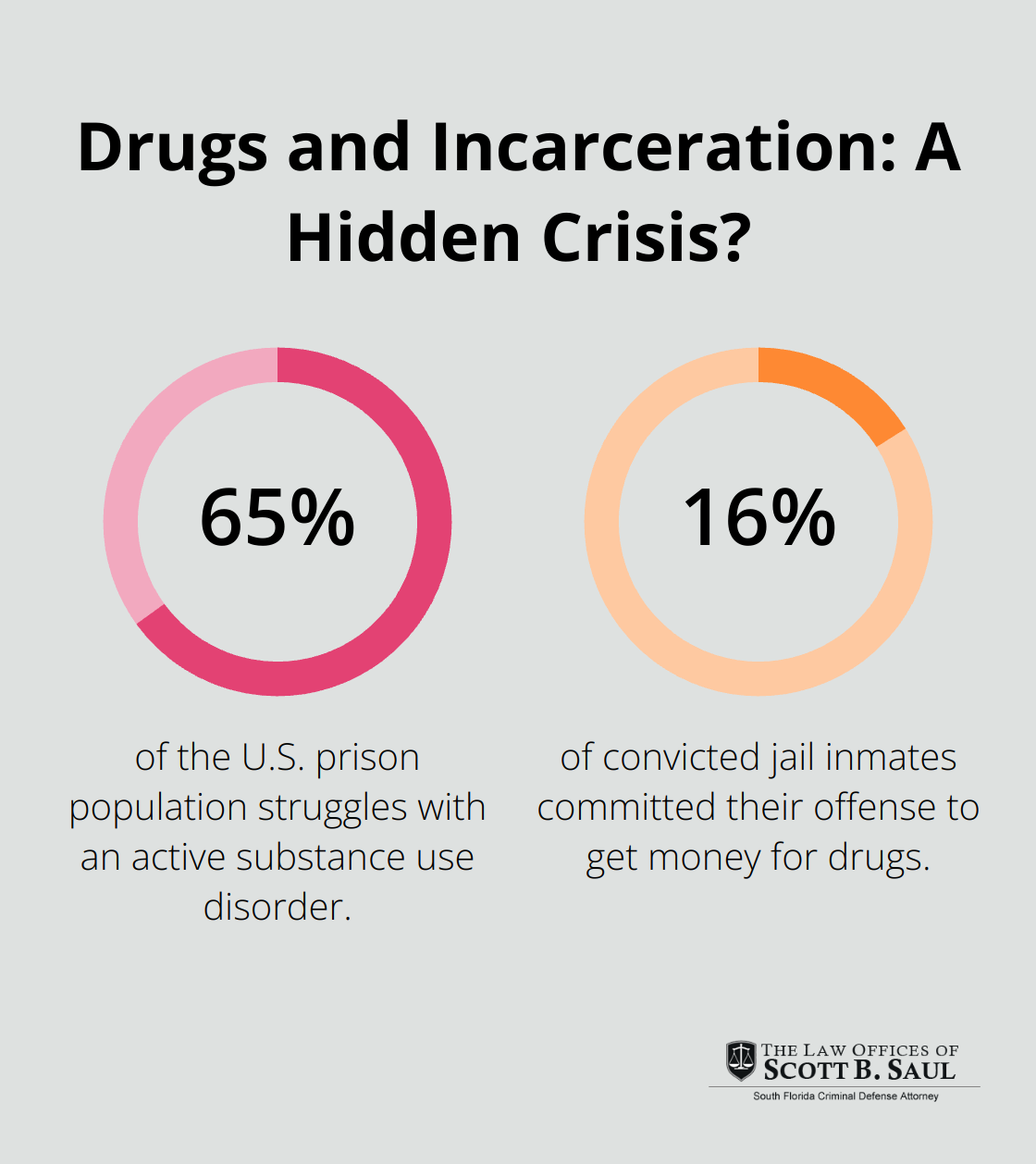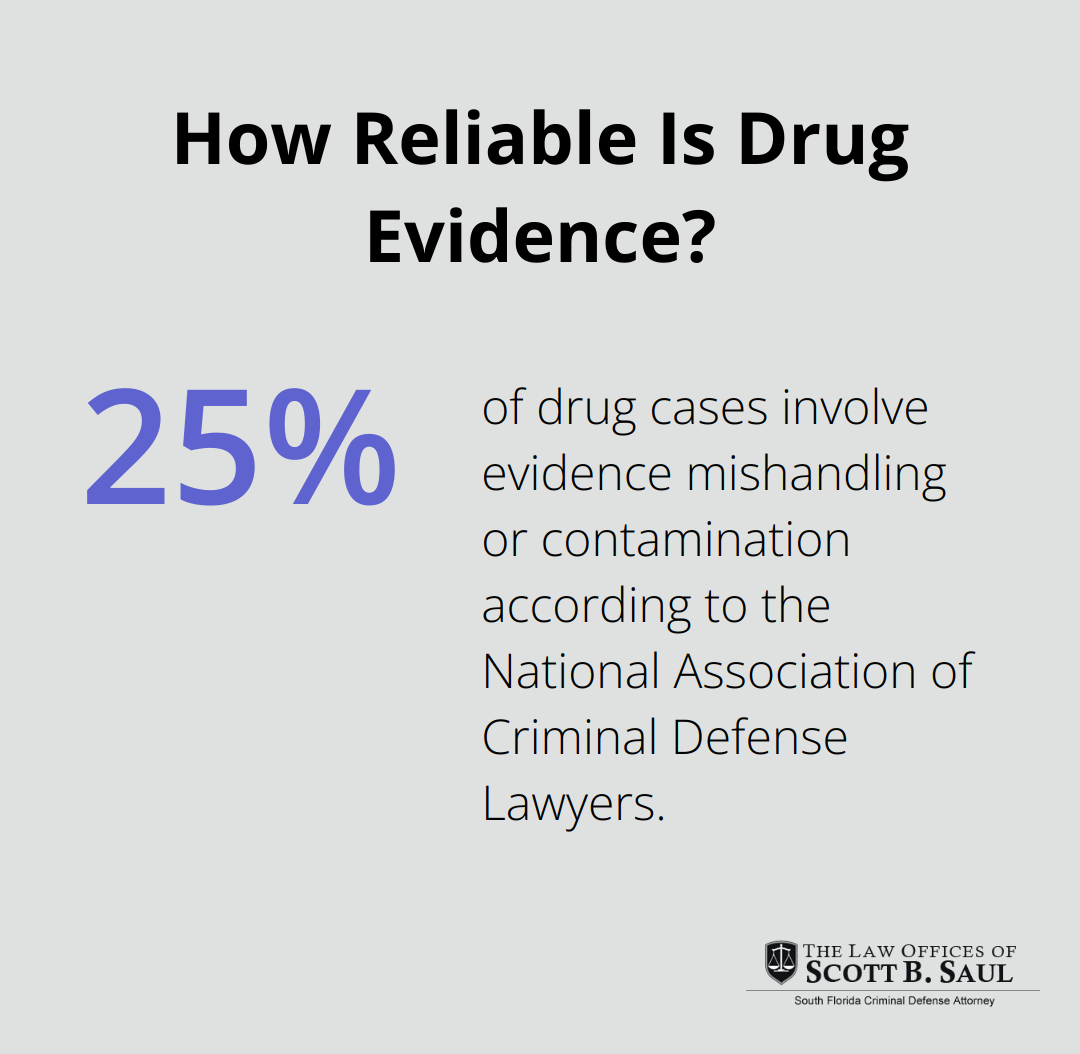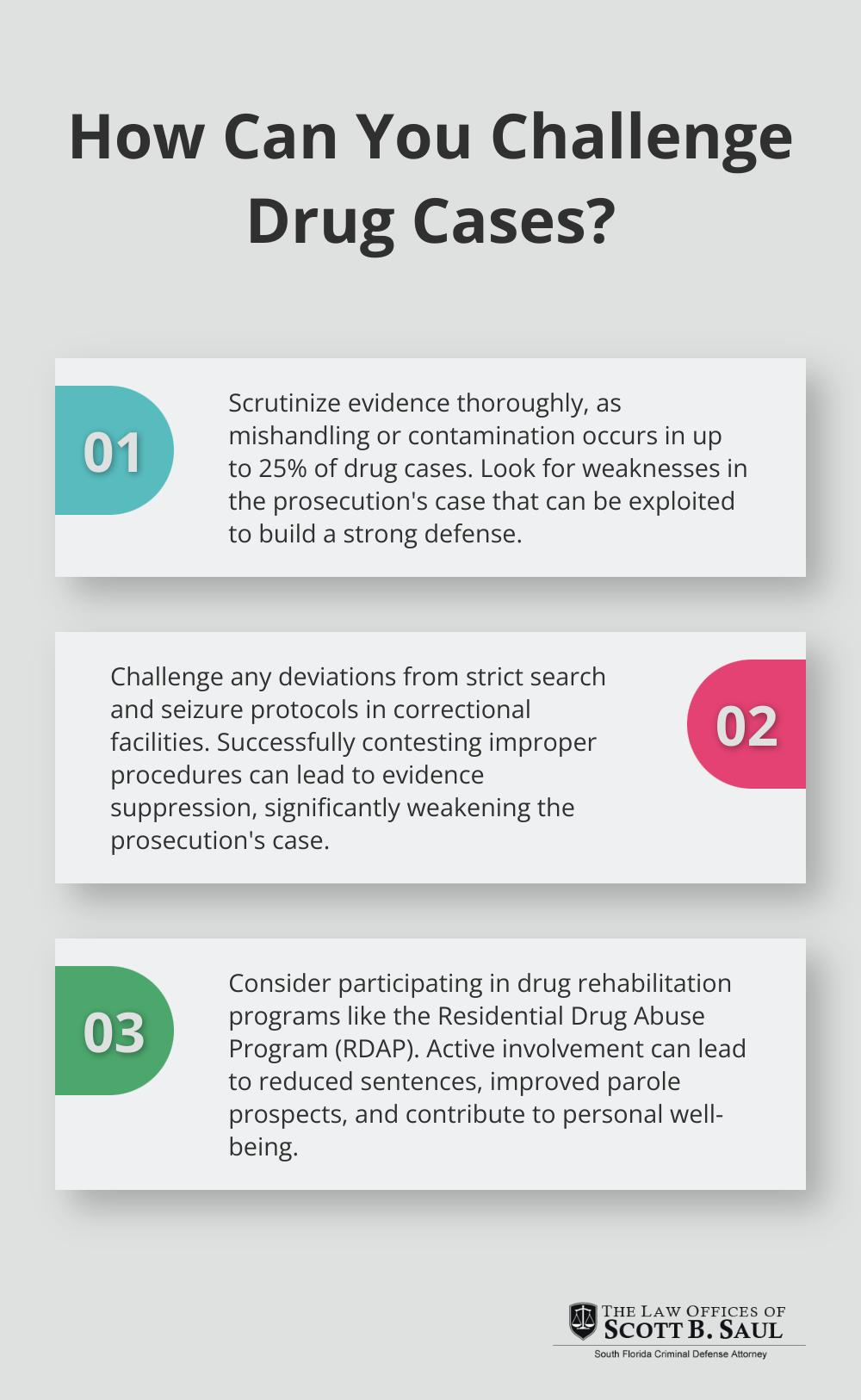Drug Offenses in Prison: What You Need to Know
By : saulcrim | Category : Criminal Defense | Comments Off on Drug Offenses in Prison: What You Need to Know
1st Dec 2024

Drug offenses in prison are a serious matter with far-reaching consequences. These crimes can significantly impact an inmate’s sentence, privileges, and future prospects.
At Law Offices of Scott B. Saul, we understand the complexities of these cases and the importance of robust legal representation. This post will explore the types of drug offenses in prison, their legal ramifications, and potential defense strategies.
Drug Offenses Behind Bars: A Persistent Challenge
Prison drug offenses continue to plague correctional facilities across the United States. 88.1% of individuals in federal prison were sentenced within the past ten years, with 67.1% sentenced within the last five years.
Possession: The Dominant Offense
Possession of illegal substances tops the list of drug offenses in prisons. This category includes not only street drugs like heroin or cocaine but also prescription medications without valid authorization. The National Institute on Drug Abuse highlights that nearly 65% of the U.S. prison population struggles with an active substance use disorder, which emphasizes the ongoing battle with addiction among inmates.
Distribution and Trafficking: Complex Networks
Distribution and trafficking of drugs within prisons create significant security risks. These operations often involve intricate networks of inmates, visitors, and (in some cases) corrupt staff members. An estimated 61,000 (16%) convicted jail inmates committed their offense to get money for drugs, indicating the widespread impact of drug-related activities.
Manufacturing: An Emerging Threat
While less frequent, the manufacturing of drugs within prison walls presents a growing concern. This activity typically involves the production of synthetic drugs or the cultivation of marijuana in concealed areas of the facility.
Smuggling: The Gateway for Contraband
Smuggling remains the primary method for introducing drugs into prisons. Innovative concealment methods continue to evolve, from hiding drugs in food items to using drones for delivery.

The prevalence and complexity of drug offenses in prisons necessitate a thorough understanding of their legal consequences. From additional criminal charges to extended sentences, the ramifications of these offenses can significantly alter an inmate’s future prospects.
Legal Consequences of Drug Offenses in Prison
Drug offenses committed within prison walls carry severe legal repercussions that can dramatically alter an inmate’s future. These consequences extend far beyond the initial sentence, potentially reshaping the entire trajectory of an individual’s incarceration and life after release.
Additional Criminal Charges: The Domino Effect
When inmates engage in drug-related activities behind bars, they face the prospect of additional criminal charges. These new charges often stack on top of their existing sentence, leading to a significant increase in overall prison time. For example, an inmate caught distributing drugs within a federal prison could face up to five (5) years in prison.

The severity of these charges often depends on the type and quantity of drugs involved. According to the United States Sentencing Commission, almost all (17,520) drug offenders were sentenced under one of the seven primary drug trafficking guidelines in fiscal year 2021. This statistic underscores the harsh stance taken against drug offenses, even when committed by those already incarcerated.
Impact on Privileges and Programs
Drug offenses in prison don’t just affect an inmate’s sentence length; they also impact daily life within the facility. Inmates found guilty of drug-related infractions often lose privileges, which can include:
- Restricted visitation rights
- Limited access to commissary
- Removal from educational or vocational programs
These consequences can prove particularly detrimental to an inmate’s rehabilitation efforts. The Federal Bureau of Prisons has conducted studies examining whether completion of vocational programs impacts recidivism among federal offenders. Losing access to such programs due to drug offenses can therefore have long-lasting effects on an inmate’s prospects for successful reintegration into society.
Parole Eligibility: A Moving Target
One of the most significant impacts of drug offenses in prison is their effect on parole eligibility. Many states use a point system to determine parole eligibility, with drug offenses often carrying substantial negative points. For instance, in Texas, a single drug-related disciplinary infraction can result in the loss of up to 365 days of good conduct time, directly affecting an inmate’s parole consideration date.
Moreover, some jurisdictions have implemented policies that automatically deny parole to inmates with in-prison drug offenses. This means that a single drug-related incident could potentially extend an inmate’s incarceration by years, if not decades.
The legal landscape surrounding drug offenses in prison is complex and ever-changing. Inmates facing such charges need experienced legal representation to navigate these treacherous waters and mitigate the potentially life-altering consequences. As we move forward, we will explore the various defense strategies that can be employed to combat these serious charges.
Effective Defense Strategies for Prison Drug Charges
Scrutiny of Evidence
A thorough examination of the prosecution’s evidence forms the cornerstone of a robust defense strategy. This process often uncovers weaknesses in the case that can be exploited. The National Association of Criminal Defense Lawyers reports that evidence mishandling or contamination occurs in up to 25% of drug cases. This statistic underscores the importance of meticulous evidence review in building a strong defense.
Challenges to Search and Seizure Procedures
Correctional facilities must adhere to strict protocols for conducting searches. Any deviation from these procedures can render evidence inadmissible. The decision in Palmer signals an end of the judicial attempt to accommodate inmates’ privacy rights against the State’s interest in maintaining law and order. Successful challenges to improper search procedures can lead to the suppression of key evidence, significantly weakening the prosecution’s case.
Rehabilitation Program Participation
For some inmates, participation in drug rehabilitation programs serves as a mitigating factor in their defense. The Federal Bureau of Prisons reports that 62.2 percent of state prison inmates and 42.1 percent of Federal inmates report being regular drug users. Enrollment in these programs not only offers potential legal benefits but also contributes to personal well-being. Active participation in the Residential Drug Abuse Program (RDAP) can lead to reduced sentences and improved parole prospects.
Strategic Plea Negotiations
In certain situations, negotiation of a plea deal proves the most advantageous strategy. The U.S. Sentencing Commission reports that in fiscal year 2021, plea agreements resolved 98.3% of drug trafficking offenses. This statistic highlights the prevalence and potential benefits of well-negotiated plea deals. A tailored approach to plea negotiations (based on the specific circumstances of each case) can result in reduced charges, shorter sentences, and improved access to rehabilitation programs.
Expertise in Federal and State Prosecution Tactics
Understanding both federal and state prosecution tactics allows for the creation of defense strategies that yield the best possible outcomes. Experienced criminal defense attorneys (such as those at the Law Offices of Scott B. Saul) possess deep knowledge of these tactics, enabling them to craft effective counter-strategies. This expertise proves invaluable in navigating the complexities of drug offense cases in prison and securing favorable results for clients.

Final Thoughts
Drug offenses in prison present complex challenges for inmates and the legal system. These offenses carry severe consequences that can dramatically alter an inmate’s future, including additional criminal charges, extended sentences, and loss of privileges. The importance of robust legal representation in these cases cannot be overstated.

Experienced attorneys can employ various defense strategies to protect inmates’ rights and impact case outcomes. These strategies include evidence scrutiny, challenging search procedures, and exploring rehabilitation options. At Law Offices of Scott B. Saul, we understand the intricacies of drug offenses in prison and offer comprehensive consultations to those facing such charges.
Our team specializes in providing personalized attention and aggressive representation (with over 30 years of experience). We stand ready to fight for your best interests, whether you face charges related to drug possession, distribution, or any other offense within a correctional facility. Don’t face these challenges alone – seek experienced legal counsel to navigate the complexities of the legal system.
Archives
- July 2025 (1)
- June 2025 (9)
- May 2025 (9)
- April 2025 (8)
- March 2025 (9)
- February 2025 (8)
- January 2025 (9)
- December 2024 (10)
- November 2024 (5)
- July 2024 (2)
- June 2024 (2)
- May 2024 (2)
- April 2024 (2)
- March 2024 (2)
- February 2024 (2)
- January 2024 (2)
- December 2023 (2)
- November 2023 (2)
- October 2023 (2)
- September 2023 (2)
- August 2023 (1)
- July 2023 (2)
- June 2023 (2)
- May 2023 (2)
- April 2023 (2)
- March 2023 (2)
- February 2023 (2)
- January 2023 (2)
- December 2022 (2)
- November 2022 (2)
- October 2022 (2)
- September 2022 (2)
- August 2022 (2)
- July 2022 (2)
- June 2022 (2)
- May 2022 (2)
- April 2022 (2)
- March 2022 (2)
- February 2022 (2)
- January 2022 (2)
- December 2021 (2)
- November 2021 (2)
- October 2021 (2)
- September 2021 (2)
- August 2021 (2)
- July 2021 (2)
- June 2021 (2)
- May 2021 (2)
- April 2021 (2)
- September 2020 (5)
- July 2020 (4)
- June 2020 (4)
- May 2020 (4)
- April 2020 (5)
- March 2020 (4)
- February 2020 (4)
- January 2020 (4)
- December 2019 (1)
- November 2019 (4)
- October 2019 (4)
- September 2019 (4)
- August 2019 (4)
- July 2019 (5)
- June 2019 (4)
- May 2019 (4)
- April 2019 (4)
- March 2019 (4)
- February 2019 (4)
- January 2019 (4)
- December 2018 (4)
- November 2018 (5)
- October 2018 (5)
- September 2018 (4)
- August 2018 (4)
- July 2018 (7)
- June 2018 (4)
- May 2018 (4)
- April 2018 (8)
- March 2018 (4)
- February 2018 (4)
- January 2018 (4)
- November 2017 (4)
- October 2017 (4)
- September 2017 (4)
- August 2017 (7)
- July 2017 (6)
- June 2017 (4)
- May 2017 (4)
- April 2017 (4)
- March 2017 (4)
- February 2017 (7)
- January 2017 (4)
- December 2016 (7)
- November 2016 (4)
- October 2016 (4)
- September 2016 (10)
- August 2016 (4)
- July 2016 (4)
- June 2016 (4)
- May 2016 (4)
- April 2016 (4)
- March 2016 (4)
- February 2016 (7)
- January 2016 (4)
- December 2015 (5)
- November 2015 (4)
- October 2015 (7)
- September 2015 (4)
- August 2015 (4)
- July 2015 (13)
- June 2015 (9)
- May 2015 (8)
- April 2015 (6)
- March 2015 (4)
- February 2015 (4)
- January 2015 (4)
- December 2014 (4)
- November 2014 (4)
- October 2014 (4)
- September 2014 (3)
Categories
- Adjudication (1)
- Bankruptcy (1)
- Burglary Crimes (3)
- calendar call (1)
- Car Accident (1)
- Criminal Defense (332)
- Cyber Crimes (7)
- DNA (1)
- Domestic Violence (9)
- Drug Crimes (5)
- DUI (12)
- Embezzlement (1)
- Environmental Crimes (4)
- Expungement Law (2)
- Federal Sentencing Law (3)
- Firearm (3)
- Forgery (4)
- General (82)
- Healthcare (3)
- Immigration (1)
- Indentity Theft (1)
- Insurance (5)
- judicial sounding (2)
- Juvenile Crimes (4)
- Manslaughter (4)
- Money Laundering (3)
- Organized Crime (1)
- Racketeering (1)
- Reckless Driving (3)
- RICO (3)
- Sealing and Expunging (2)
- Sex Offense (1)
- Shoplifting (1)
- Suspended Driver's License (1)
- Traffic (4)
- Trending Topics (1)
- White-collar Offenses (1)

